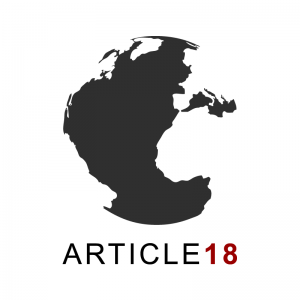By Martin Surridge – France can’t seem to stay out of global headline news at the moment. In a two week period, Sarkozy’s government managed to team up with the U.N. to lead the charge against Gbagbo in the Ivory Coast, play an important military role in the ongoing efforts in Libya against Gaddafi’s forces, and is now turning heads with a significant and controversial piece of domestic public policy–the enforcement of a ban against deliberately concealing one’s face, which includes Muslim women wearing full-face veils in public. 
This is Article18-RLTV’s weekly blog specifically dedicated to religious liberty issues in other countries around the world. Each week, we focus on a different nation, and the struggles facing one of its religious communities. This week: France, which just a few days ago became the first nation to make it illegal to don a burqa or a niqab, the opaque attire that is often required to be worn by traditional Muslim women throughout much of the Middle East.
Journalists estimate that between 400-2000 women are currently wearing the burqa in France. To a select few of those women, the first fines were issued this week–violators can expect to pay a fee of 150 euros or take citizenship lessons. The police have been carefully instructed, however, not to unveil the offenders but simply issue the citation. The penalty for requiring one’s wife or a minor to wear the burqa, the most concealing of all Islamic veils, is more harsh and can include prison time and fines near the 40,000 euro mark.
Speaking to the media outside of congress, Sarkozy sidestepped the religious tradition issue and instead made the conversation about personal freedom. He explained that the “burka doesn’t pose a religious question but one of freedom. The burka enslaves women, makes them prisoners and deprives them of any social life. There is no place for the burka within the French Republic.”
But despite Sarkozy’s rhetoric, or perhaps because of it, many in the media are calling foul play. Some claim that the law is inherently racist and unfairly targets Muslims, but French law has also banned the wearing of ski-masks on the streets of Paris and other cities, which is further evidence that the reasons behind the ban truly could be the safety of French citizens and the elimination of masked women in public spaces. Additionally, when the hidden identity is compounded with the culture shock and language difficulty that many of these recent immigrants face in France, it is perhaps understandable why many government workers find it difficult to administer these women as witnesses in court or serve them at French motor vehicle offices.
Other activists believe that the law places the well-being of these women at risk and further alienates them in society. The ban has been met by protests in France, opposition in other countries, and will also apply to tourists from the Middle East who are vacationing or visiting family in France.
Katharine Birbalsingh of the The Telegraph believes that Britain could be next country to institute such a ban, and Canada’s National Post was quick to declare that even though the niqab and the burqa are indeed offensive “badge[s] of servility [from] backwards, tribalized societies,” an outright ban on the full-face veil in public is wrong. The National Post also explained that,
“In a free society, people must be free to communicate offensive messages, as much in their dress as in their actual speech. If a Muslim woman is free to state the words “I am a social prisoner of my husband, willing to erase my public identity to fulfil the expectations imposed on me by some retrograde interpretation of Islam,” then why can this message not be equally communicated, indirectly, by her dress?
A common objection to this is that niqabbed Muslim women do not dress as they do of their own volition; that they are forced to do so by their husbands and families. And so the fabric on their faces is an artifact of domestic abuse, not a mere article of clothing. But even in such cases what good does it do to attack the symptom of abusive domestic relationships? A woman who dresses publicly in jeans and T-shirt but is beaten by her husband behind closed doors represents as much a tragedy as a niqab-clad woman who avoids trouble by silently following her tyrannical relatives’ wishes.”
RLTV contributor Joshua Crouch is a graduate student in the School of Public Health at Loma Linda University in California. He has lived in France, traveled in the Middle East, and studied the impact of Islam on the region in an undergraduate history degree. Crouch shared his views on the “burqa ban” in France.
“The law answers the short term issue of fear,” Crouch commented. “People are afraid of what they don’t understand, and even the traditionally progressive French are intimidated by Islam’s culture pervading their country.”
He might not be far off. The Swiss famously banned the construction of new minarets under the guise of “culture retention and skyline protection.” The French government have been posturing and threatening to implement a veil ban for several years and now that it is in effect, it will be interesting to see how this religious liberty issue plays out in Europe and elsewhere too.
“I understand the reason behind it,” Crouch continued, “there aren’t really any other situations where you can’t see people’s faces. You don’t know who is behind that veil, and you can’t identify them, just like someone wearing a ski-mask in a bank. Yes, there’s sexism and bigotry in fundamentalism Islam, just like there is in fundamentalist Christianity, but I don’t think we have a right to tell women what they can and can’t do in their religion or their relationship.”
Article18 is a weekly blog written by Martin Surridge, Associate Editor of Religious Liberty TV. Article18 logo and artwork created by Bradley Kenyon.